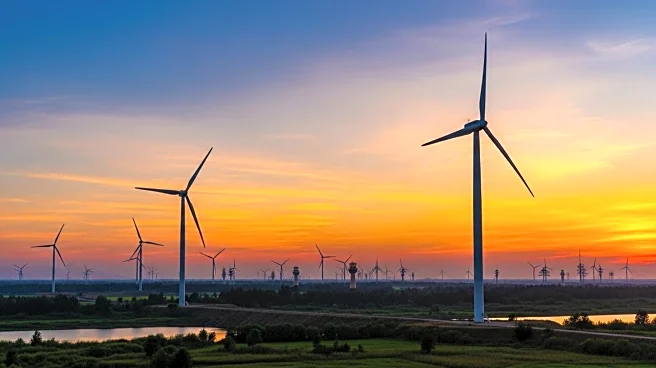What's Happening?
The proposed Banahaw Wind Power Project in the Philippines has sparked controversy due to its location near Mount Banahaw, a sacred and protected landscape. The project, led by GIGAWIND4, INC., a subsidiary of ACEN Corp., aims to build a 247-megawatt wind farm to support the country's renewable energy goals. However, environmental organizations and local communities oppose the project, citing its potential impact on cultural heritage and ecological integrity. Critics argue that the construction of wind turbines near the protected area could lead to soil erosion, flooding, and disruption of watershed services. The opposition also raises concerns about the lack of proper consultation with local communities and the prioritization of corporate interests over cultural preservation.
Why It's Important?
The controversy highlights the challenges of balancing renewable energy development with environmental justice and cultural preservation. As the Philippines seeks to increase its renewable energy share, the Banahaw Wind Power Project serves as a critical test case for how such projects can be implemented without compromising the rights and welfare of host communities. The opposition underscores the need for more inclusive and transparent decision-making processes that consider the voices of affected communities. This case is significant for policymakers and industry leaders as they navigate the complexities of achieving national climate goals while respecting cultural and environmental values.
What's Next?
The project is currently in the early stages of pre-development, with ACEN Corp. emphasizing that no investment decision has been made yet. The upcoming phases of the Environmental Impact Assessment, particularly the Public Scoping sessions, will be crucial for determining the project's future. These sessions will provide a platform for opponents to formally register their concerns and potentially influence the project's direction. The outcome of these consultations will set a precedent for how similar conflicts between renewable energy development and cultural preservation are resolved in the Philippines.
Beyond the Headlines
The opposition to the wind farm project raises broader questions about the environmental credentials of renewable energy projects. Critics argue that the manufacturing of wind turbines relies on extractive industries, which can have significant environmental impacts. This perspective calls for a more holistic evaluation of renewable energy projects, considering their full lifecycle and hidden environmental costs. The Banahaw case challenges stakeholders to rethink the criteria for sustainable development and explore alternative approaches that minimize ecological and cultural disruptions.











